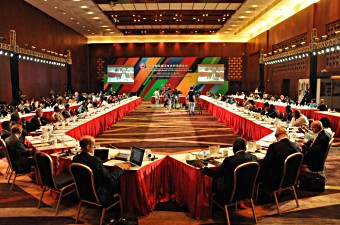
Beijing, 16 August 2013 – China President Xi Jinping thanked high-level representatives of international organisations, including the GAVI Alliance, on Friday for their role in supporting China-Africa health development.
The President was speaking at the first-ever meeting of health ministers under the Forum on China-Africa Cooperation (FOCAC). Almost 50 African ministers of health attended the event, together with observers from international organisations, including Mercy Ahun, special representative to GAVI eligible countries.
President Xi Jinping emphasised his country’s continued commitment to supporting the work of international organisations working in global health and helping African countries achieve the Millennium Development Goals.
Beijing declaration
Also at the Forum, health ministers and officials launched the Beijing Declaration of the Ministerial Forum on China-Africa Health Development, which sets a road map for jointly addressing key health challenges across Africa, including malaria, schistosomiasis, HIV/AIDS, reproductive health, immunisation and vaccine-preventable diseases.
Under the Declaration, China and African countries will embark on new efforts to achieve sustainable, long-term health solutions, such as increasing partnerships on joint research and addressing the shortage of healthcare workers. The Declaration emphasises that health cooperation efforts will align with African countries’ priorities as well as national and regional development plans.
Sustainable health progress
“China and African countries have enjoyed strong and effective partnerships on health for half a century, based on our common experiences and our shared vision for a brighter and healthier future for all our citizens,” said Awa Coll-Seck, health minister for Senegal and a member of the GAVI Alliance Board.
“The Beijing Declaration solidifies our governments’ commitments to developing and implementing Africa-led strategies that drive sustainable health progress and improve the lives of people across the continent.”
New type of partnership
Earlier, Dr Ahun addressed the Forum on ‘Future development prospects of promoting China-Africa health cooperation’.
“(The Forum) is a good example of a new type of partnership: bilateral arrangements enhanced with and through multilateral support. The GAVI Alliance looks forward to working closely with China and Africa on this ambitious endeavour and creating a world where life-saving immunisation is available to those in need, regardless of where they are and their ability to pay,” she said.
China-GAVI partnership
From 2002 to 2006, GAVI and the Chinese government co-funded a US$ 76 million project to target the vaccination of newborns and children under five in the western and central provices.
Dr. Ahun pointed to GAVI’s 2002-2010 partnership with China to support the introduction of hepatitis B (hepB) vaccine in the remote west and central provinces as “an extraordinary example of a mechanism that has achieved remarkable results.”
In 2005, the Chinese Government decided to introduce the vaccine into its routine immunisation programme. In the past decade, the percentage of newborn children immunised with the first dose of hepB vaccine at birth has climbed from 64% to over 90% in most areas. Less than one percent of children under the age of five are now chronic carriers of hepB.
Innovative mechanism
International organisations represented at the Great Hall of the People, including GAVI and its partners WHO and UNICEF, welcomed the China-Africa Forum as an innovative mechanism to ensure dialogue between high-level leadership in support of health development and cooperation between China and African countries.
